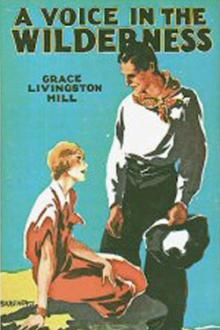A Voice in the Wilderness by Grace Livingston Hill (best short books to read .TXT) 📕

- Author: Grace Livingston Hill
- Performer: -
Book online «A Voice in the Wilderness by Grace Livingston Hill (best short books to read .TXT) 📕». Author Grace Livingston Hill
Margaret had spent Saturday in rehearsals, so that there had been no rest for her. Sunday morning she slept late, and awoke from a troubled dream, unrested. She almost meditated whether she would not ask some one to read a sermon at the afternoon service and let her go on sleeping. Then a memory of the lonely old woman at the camp, and the men, who came so regularly to the service, roused her to effort once more, and she arose and tried to prepare a little something for them.
She came into the school-house at the hour, looking fagged, with dark circles under her eyes; and the loving eyes of Mom Wallis already in her front seat watched her keenly.
"It's time for him to come back," she said, in her heart. "She's gettin' peeked! I wisht he'd come!"
Margaret had hoped that Rosa would not come. The girl was not always there, but of late she had been quite regular, coming in late with her father just a little after the story had begun, and attracting attention by her smiles and bows and giggling whispers, which sometimes were so audible as to create quite a diversion from the speaker.
But Rosa came in early to-day and took a seat directly in front of Margaret, in about the middle of the house, fixing her eyes on her teacher with a kind of settled intention that made Margaret shrink as if from a danger she was not able to meet. There was something bright and hard and daring in Rosa's eyes as she stared unwinkingly, as if she had come to search out a weak spot for her evil purposes, and Margaret was so tired she wanted to lay her head down on her desk and cry. She drew some comfort from the reflection that if she should do so childish a thing she would be at once surrounded by a strong battalion of friends from the camp, who would shield her with their lives if necessary.
It was silly, of course, and she must control this choking in her throat, only how was she ever going to talk, with Rosa looking at her that way? It was like a nightmare pursuing her. She turned to the piano and kept them all singing for a while, so that she might pray in her heart and grow calm; and when, after her brief, earnest prayer, she lifted her eyes to the audience, she saw with intense relief that the Brownleighs were in the audience.
She started a hymn that they all knew, and when they were well in the midst of the first verse she slipped from the piano-stool and walked swiftly down the aisle to Brownleigh's side.
"Would you please talk to them a little while?" she pleaded, wistfully. "I am so tired I feel as if I just couldn't, to-day."
Instantly Brownleigh followed her back to the desk and took her place, pulling out his little, worn Bible and opening it with familiar fingers to a beloved passage:
"'Come unto me, all ye that labor and are heavy laden, and I will give you rest.'"
The words fell on Margaret's tired heart like balm, and she rested her head back against the wall and closed her eyes to listen. Sitting so away from Rosa's stare, she could forget for a while the absurd burdens that had got on her nerves, and could rest down hard upon her Saviour. Every word that the man of God spoke seemed meant just for her, and brought strength, courage, and new trust to her heart. She forgot the little crowd of other listeners and took the message to herself, drinking it in eagerly as one who has been a long time ministering accepts a much-needed ministry. When she moved to the piano again for the closing hymn she felt new strength within her to bear the trials of the week that were before her. She turned, smiling and brave, to speak to those who always crowded around to shake hands and have a word before leaving.
Hazel, putting a loving arm around her as soon as she could get up to the front, began to speak soothingly: "You poor, tired child!" she said; "you are almost worn to a frazzle. You need a big change, and I'm going to plan it for you just as soon as I possibly can. How would you like to go with us on our trip among the Indians? Wouldn't it be great? It'll be several days, depending on how far we go, but John wants to visit the Hopi reservation, if possible, and it'll be so interesting. They are a most strange people. We'll have a delightful trip, sleeping out under the stars, you know. Don't you just love it? I do. I wouldn't miss it for the world. I can't be sure, for a few days yet, when we can go, for John has to make a journey in the other direction first, and he isn't sure when he can return; but it might be this week. How soon can you come to us? How I wish we could take you right home with us to-night. You need to get away and rest. But your Commencement is to-morrow, isn't it? I'm so sorry we can't be here, but this other matter is important, and John has to go early in the morning. Some one very sick who wants to see him before he dies—an old Indian who didn't know a thing about Jesus till John found him one day. I suppose you haven't anybody who could bring you over to us after your work is done here to-morrow night or Tuesday, have you? Well, we'll see if we can't find some one to send for you soon. There's an old Indian who often comes this way, but he's away buying cattle. Maybe John can think of a way we could send for you early in the week. Then you would be ready to go with us on the trip. You would like to go, wouldn't you?"
"Oh, so much!" said Margaret, with a sigh of wistfulness. "I can't think of anything pleasanter!"
Margaret turned suddenly, and there, just behind her, almost touching her, stood Rosa, that strange, baleful gleam in her eyes like a serpent who was biding her time, drawing nearer and nearer, knowing she had her victim where she could not move before she struck.
It was a strange fancy, of course, and one that was caused by sick nerves, but Margaret drew back and almost cried out, as if for some one to protect her. Then her strong common sense came to the rescue and she rallied and smiled at Rosa a faint little sorry smile. It was hard to smile at the bright, baleful face with the menace in the eyes.
Hazel was watching her. "You poor child! You're quite worn out! I'm afraid you're going to be sick."
"Oh no," said Margaret, trying to speak cheerfully; "things have just got on my nerves, that's all. It's been a particularly trying time. I shall be all right when to-morrow night is over."
"Well, we're going to send for you very soon, so be ready!" and Hazel followed her husband, waving her hand in gay parting.
Rosa was still standing just behind her when Margaret turned back to her desk, and the younger girl gave her one last dagger look, a glitter in her eyes so sinister and vindictive that Margaret felt a shudder run through her whole body, and was glad that just then Rosa's father called to her that they must be starting home. Only one more day now of Rosa, and she would be done with her, perhaps forever. The girl was through the school course and was graduating. It was not likely she would return another year. Her opportunity was over to help her. She had failed. Why, she couldn't tell, but she had strangely failed, and all she asked now was not to have to endure the hard, cold, young presence any longer.
"Sick nerves, Margaret!" she said to herself. "Go home and go to bed. You'll be all right to-morrow!" And she locked the school-house door and walked quietly home with the faithful Bud.
The past month had been a trying time also for Rosa. Young, wild, and motherless, passionate, wilful and impetuous, she was finding life tremendously exciting just now. With no one to restrain her or warn her she was playing with forces that she did not understand.
She had subjugated easily all the boys in school, keeping them exactly where she wanted them for her purpose, and using methods that would have done credit to a woman of the world. But by far the greatest force in her life was her infatuation for Forsythe.
The letters had traveled back and forth many times between them since Forsythe wrote that first love-letter. He found a whimsical pleasure in her deep devotion and naïve readiness to follow as far as he cared to lead her. He realized that, young as she was, she was no innocent, which made the acquaintance all the more interesting. He, meantime, idled away a few months on the Pacific coast, making mild love to a rich California girl and considering whether or not he was ready yet to settle down.
In the mean time his correspondence with Rosa took on such a nature that his volatile, impulsive nature was stirred with a desire to see her again. It was not often that once out of sight he looked back to a victim, but Rosa had shown a daring and a spirit in her letters that sent a challenge to his sated senses. Moreover, the California heiress was going on a journey; besides, an old enemy of his who knew altogether too much of his past had appeared on the scene; and as Gardley had been removed from the Ashland vicinity for a time, Forsythe felt it might be safe to venture back again. There was always that pretty, spirited little teacher if Rosa failed to charm. But why should Rosa not charm? And why should he not yield? Rosa's father was a good sort and had all kinds of property. Rosa was her father's only heir. On the whole, Forsythe decided that the best move he could make next would be to return to Arizona. If things turned out well he might even think of marrying Rosa.
This was somewhat the train of thought that led Forsythe at last to write to Rosa that he was coming, throwing Rosa into a panic of joy and alarm. For Rosa's father had been most explicit about her ever going out with Forsythe again. It had been the most relentless command he had ever laid upon her, spoken in a tone she hardly ever disobeyed. Moreover, Rosa was fearfully jealous of Margaret. If Forsythe should come and begin to hang around the teacher Rosa felt she would





Comments (0)